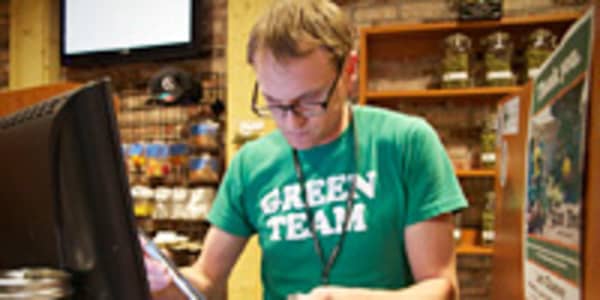Is marijuana a harmless giggle, as John Lennon once called it, or a dangerous and illicit addiction?
The debate has once again been pushed to the forefront, thanks to a couple of timely factors.
Fourteen states have passed laws in favor of medical marijuana, designed to ease the suffering of those in chronic pain, while state lawmakers are debating whether or not some form of limited legalization—and, therefore, taxation—could help plug massive budget holes.
“The economy is sharpening the minds of politicians,” says Allen St. Pierre, executive director of the Washington, D.C.-based , Norml. “It’s hard to argue that prohibition is succeeding."
Powerful, yet subtle demographic forces are also at work.
"You're seeing a paradigm shift," says Dr. David E. Smith, a pioneer in drug treatment, founder of San Francisco's Haight-Ashbury Free Clinicand former president of the American Society of Addiction Medicine. "The boomers are influential now; they say, 'I smoked that back in 1967, it wasn't so bad.'"
Still, what about the underlying health, social and moral issues involved? Are changing public perceptions of marijuana a sign that existing laws should be repealed, or merely a symptom of a rootless society’s blurring of right and wrong?
After all, recent polls shows a majority of Americans now support medical marijuana.
That is deeply troubling to addiction experts like Dr. Herbert Kleber. The Columbia psychiatry professor says that marijuana use is anything but an innocuous pastime.
'Not A Harmless Drug'
“Marijuana is not a harmless drug,” says Kleber, founder of the university’s Division on Substance Abuse and a deputy director for the White House’s Office of National Drug Control Policy under George H.W. Bush. “Its potency has increased markedly in the past few decades, it is addicting, and more people than ever are seeking treatment for marijuana dependence.”
Around 800,000 a year, in fact. When it comes to medical marijuana, Kleber says that any number of approved drugs can do what pot does, such as reduce nausea for those undergoing chemotherapy.
In the meantime, Kleber argues, marijuana can lead to a raft of respiratory problems with its carcinogenic smoke. It can also act as a gateway drug, with users more likely to go on to try cocaine or heroin.
The Drug Enforcement Agency is even more blunt in its medical assessment, calling marijuana "dangerous" with the high potency versions of today creating "dependency and treatment issues."
Perhaps most disturbing, opening the Pandora’s box of access for adults will very likely lead to more prevalent use among the young, Kleber says. That could boost related problems once teenagers get hooked, like schizophrenia, panic attacks and paranoia, and driving while high.
“The more you make marijuana available, the more you’ll see its use in teenagers, and the more casualties you’re going to see," says Kleber
Marijuana advocates, for their part, see in such arguments a host of false assertions akin to the hysteria of the 1930s captured in the infamous "Reefer Madness" movie.
“There’s never been a single case of a marijuana smoker acquiring lung cancer,” counters Mason Tvert, executive director of the Denver-based advocacy group, Safer Alternative for Enjoyable Recreation, SAFER.
Not A 'Gateway Drug'
“Every objective study shows that marijuana is not a gateway drug, and certainly no more so than alcohol, which every single drug user in America tried first," adds Tvert. "And the youth argument is absurd: Right now high school students have virtually universal access to marijuana, because it’s a black market and no one is asking for ID. If it were regulated and controlled, they’d actually have less access.”
Other legalization supporters, such as Law Enforcement Against Prohibition, LEAP, say not one fatal overdose has even been attributed to marijuana.
But cannabis opponents see increased leniency as a dangerous trend, not a compassionate one.
Chris Bathum, CEO and executive director of Malibu, Calif.-based Seasons Recovery Centers, has seen countless downward spirals as a result of long-term pot use, and says that the idea of victimless enjoyment is a myth.
“It might appear less dangerous than alcohol, but in the recovery business alcohol is the most dangerous drug of all,” says Bathum. “So it’s a false choice, if you’re just saying it’s not as bad as the worst. The increase in potency is changing the way it affects people: I’ve been doing this since 1980, and I’ve never seen the frequency of marijuana-induced psychosis that we’re seeing now.”
Such health and moral issues will come to a boil in coming months. In November, Californiavoters will decide whether or not pot will be legally sold and taxed.
On one side are law enforcement groups—cannabis sale and possession remain federal crimes, after all—and the President’s own drug czar, R. Gil Kerlikowske, who is firmly against any kind of legalization.
But supporters see an inexorable march, in which marijuana will be treated not as a hard drug along the lines of cocaine or heroin, but a more garden-variety vice like alcohol or tobacco, in which responsible adults should be able to indulge.
“In a free-market society, prohibition of popular products just doesn’t work,” says Norml’s St. Pierre. “Marijuana needs to be legally controlled, like alcohol and tobacco products. Smoking may be an unhealthy endeavor, but it shouldn’t be a criminal one.”



